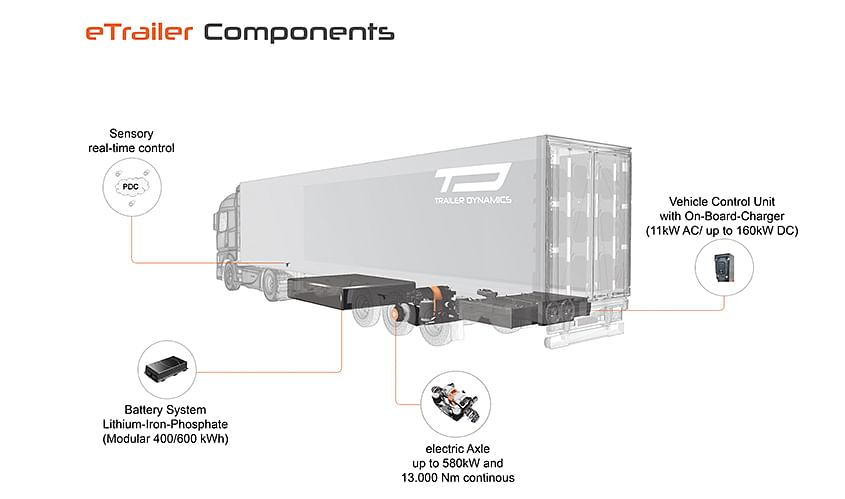BMW Group Logistik tests electric semi-trailer, sees 48% savings over diesel trucks
Real-world logistics operations of an electrically powered semi-trailer on various tracks and over varying distances; achieves over 600km range with an electric tractor.
BMW Group Logistik, in collaboration with Trailer Dynamics, has successfully tested an electrically powered semi-trailer on various tracks and over varying distances in real-world logistics operations. With the diesel truck used, average fuel savings of more than 46% over short and medium distances, and more than 48% over long distances, were attained. Using a combination of electric tractor and e-trailer, a range of more than 600 kilometres without recharging was achieved.
There were four days of pilot tests over short and medium distances around the BMW Group location at Dingolfing, and three days of testing over long distances between Mamming in Lower Bavaria and the BMW Group plant in Leipzig. The capabilities of Trailer Dynamics’ e-trailer were put to the test to identify the best application scenarios for BMW Group Logistik.
“We are using visionary projects to consistently accelerate the BMW Group’s Green Transport Logistics strategy. The pilot testing with Trailer Dynamics’ e-trailer showed that using this kind of electrified semi-trailer significantly reduces the fuel consumption of standard diesel tractors and noticeably increases the range of e-trucks,” said Michael Nikolaides, Head of BMW Group Production Network and Logistics.

Semi-trailer with electric drive axle
Unlike a conventional semi-trailer, the e-trailer from Trailer Dynamics of Eschweiler near Aachen is fitted with its own battery and electric drive axle. This axle supports the semi-trailer truck’s engine. Integrated sensors on the kingpin between the tractor and the trailer ensure an optimum load ratio and thus the best-possible fuel economy. As well as reducing the tractor’s energy consumption, the e-trailer’s powered axle also provides additional power during start-up and on slopes. In combination with a diesel truck, security of supply is also ensured even if the battery of the e‑trailer is empty.
The tests over a medium distance took place over four consecutive days on real logistics routes around the BMW Group location of Dingolfing. The round trip transportations with demanding route topographies were carried out with the logistics service provider Gahr International. Up to 250 kilometres were covered per day on motorways and main roads, with automated and simultaneous data collection from the e-trailer and tractor being performed for the first time. That showed an average reduction in diesel consumption of 46.59 percent.
Even greater fuel savings over long distances
The long-distance tests were also performed on real logistics routes and with a load of more than 16 tonnes between Leipzig and Mamming. Energy modules for BMW electric cars were transported over a distance of 450 kilometres with mainly on motorways. Compared with journeys with a conventional trailer and identical load, this resulted in diesel savings of more than 48 percent on average. The e-trailer’s battery was charged carbon neutrally using 100 percent green energy, meaning that with series application, a single electric trailer could facilitate a CO2 reduction of around 120 tonnes per year (“Well to Wheel”).
100% CO2 reduction when used with an e-truck
A 100% reduction in CO2 while simultaneously enabling long-distance routes can be achieved by combining an e-trailer with an electric tractor and 100 percent green electricity. This scenario was tested on the final day of medium-distance testing in the Dingolfing area using a Volvo e‑truck. With a normal load, a driving distance of more than 600 kilometres was achieved without recharging.
The fuel savings when using e-trailers are counterbalanced by their heavier weight and the resulting lower payload, but this is partially offset by an increase in the permissible total weight for trailers in the EU. The higher acquisition costs of the e-trailer are counteracted by lower operating costs. Over long distances in particular, the use of e-trailers can facilitate a significant decarbonisation of the existing fleet while simultaneously saving costs.
RELATED ARTICLES
Autoliv Plans JV for Advanced Safety Electronics With China’s HSAE
The new joint venture, which is to be located strategically near Shanghai and close to several existing Autoliv sites in...
JLR to Restart Production Over a Month After September Hacking
Manufacturing operations at the Tata Group-owned British luxury car and SUV manufacturer were shut down following a cybe...
BYD UK Sales Jump 880% in September to 11,271 units
Sales record sets the UK apart as the largest international market for BYD outside of China for the first time. The Seal...






 By Autocar Professional Bureau
By Autocar Professional Bureau
 28 Oct 2023
28 Oct 2023
 6378 Views
6378 Views


















 Ajit Dalvi
Ajit Dalvi




